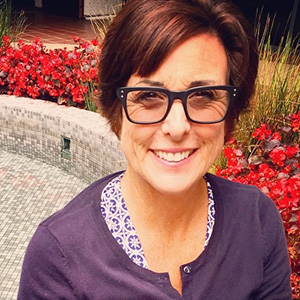
Ruth Webster
The SDSU Writers’ Conference has a long history of launching careers by opening doors. This annual conference was among the first to pioneer 1:1 appointments with agents and editors, giving writers unprecedented access to top-tier publishing professionals — many of whom interact with unpublished authors only through conferences.
Among the more than 300 writing enthusiasts/aspiring authors who descended upon the 2015 SDSU Writers’ Conference was Ruth Webster, who came in search of feedback on her memoir, Where I Went When I Was Gone. Among her scheduled appointments was an Advance Reading with April Osborn, an assistant editor with St. Martin’s Press.
Advance Reading appointments require submitting the first 10 pages of your manuscript to be read prior to the conference. Attendees also have the option of scheduling a Consultation appointment, which is a Q&A opportunity to pitch your project as a whole and discuss its viability in the marketplace.
Every year, each editor and agent chooses their favorite project(s) for a Conference Choice Award, and Webster’s was chosen by Osborn. We trace Webster’s SDSU Writers’ Conference experience, and where she is today on her journey to publication.
Are you a writer by profession or is it an avocation?
Hard to say — I was a freelance journalist and later a features staff writer for the North County Times, so I suppose I was a writer by profession. I also sold a children’s book manuscript to National Geographic and though it was never published, I spent the advance in a heartbeat. Now I’m working as an attorney (part-time) and writing is an avocation.
Tell us about the project the brought you to the SDSU Writers’ Conference.
I brought my memoir, Where I Went When I Was Gone. It’s in the vein of Cheryl Strayed’s Wild and Elizabeth Gilbert’s Eat Pray Love, about my recent experience working as a Peace Corps volunteer in the small African kingdom of Swaziland. My story is not only one of survival — living alone in a hut in rural Africa without running water or electricity — but a personal journey to find meaning in my charmed but unsatisfying life as a middle-aged wife and mother of two.
How long have you been working on it?
About three years, or when I returned from Swaziland.
Care to share the opening line or paragraph?
Depression has well and truly set in again. That still, dark, dead thump of depression that has descended at different times in my life making me virtually paralytic with sadness, a flu bug to the psyche. It is a dark hold; it is numbing. It is a pain in my head and a voice telling me to do away with myself — the only thing I can think of to stop the constant aching and pain that rises within me. I am a terrible mother. A bitchy wife. A crap writer. A moody, difficult daughter. And a wife hell bent on adultery.
Could you tell that April was pretty excited about your 10 pages or was it a complete surprise when you heard your name announced as an Editor’s Choice winner?
I thought she liked it but it was a complete surprise when my name was announced.
Are you still heady with euphoria?
Yes! I can’t tell you how gratifying it was to have someone (completely objective and in the publishing world) think my writing is good. It has given me so much confidence as I start the process of querying agents.
Did she give you any suggestions on reworking the first 10 pages before sending her the complete manuscript?
She really didn’t give me much criticism, but called my writing “impressive” and that she liked the way the story began. She did tell me that I have a good sense of humor and to not forget to weave that in where I can, which I thought was a great tip.
What was her response to your complete manuscript?
I haven’t heard back yet.
How did you hear about the SDSU Writers’ Conference?
Two women in my weekly writing critique group had attended and encouraged me to attend. I’m so glad they did!
Was 2015 your first time at the conference or have you attended before?
This was the first time I have attended the conference and I will certainly do so again.
What do you think is one of the greatest strengths of the conference?
There are two that really stand out: the access given to the participants to agents and editors is unparalleled. And the one-on-one sessions with agents and editors is worth its weight in gold. It was particularly fabulous to be able to submit 10 pages for an advanced reading.
Had you been querying agents and trying to get representation prior to the conference? If so, what has the response been?
No, not prior to the conference. I have just started querying agents and the response has been really good. I would say almost half of those I queried have asked to see either the first 50 pages, the first three chapters, a proposal, or the entire manuscript. And the entire manuscript is currently being considered by two big New York agents, so I’m really hopeful.
Did you take advantage of the conference’s On-the-Spot Query Letter Critique session on Friday? If so, did you get constructive feedback?
I thought that was probably the most valuable session of the conference. It was terrific to get an inside peek into the workings of an agent’s mind as he/she reads a query. And I was happily surprised that their reaction (in general) was not unlike my own. My friend Sheri and I jotted down on our pitches as we listened and then tried them out on agents and editors when we spoke to them about our work at the mixers later.
Did you make a connection with a fellow writer or an editor or agent at one of the mixers or the networking lunch?
I made a number of connections with fellow writers, but I was a bit too intimidated to talk much with the agents and editors. Next time I’m not going to be such a wallflower!
What’s the first book that spoke to you as a young reader?
The first books that I remember reading on my own and loving were the Oz books by L. Frank Baum. My mother, when she was little — maybe 10 or so — used to take the Red Car in Los Angeles to a bookstore at the other end of town to buy a new hardbound Oz book every month. She has since given me her collection and … you’ve just inspired me to get up, take Tik-Tok of Oz off the shelf, and crack it open. Copyright 1912. I still love them, with their stiff browned pages, extraordinary illustrations, and whimsical writing.
Who’s your favorite author (or top three if it’s hard to choose one)?
Ann Patchett, Rohinton Mistry, Alexandra Fuller, Nick Hornby, Karl Ove … so hard to narrow down.
What keeps you going in the pursuit of your writing goal?
Fame and fortune? Truthfully, I have always been writing and I would be heartbroken at the thought of never being able to write again. And I would love to be published. I guess that is my writing goal, though I try to focus on the process rather than the success of the finished product.
Anything you’d like to add?
I’ve hired a writing coach (Marni Freedman — so good) and she’s given me a huge list of to-dos so I’m currently doing a pretty massive rewrite.
I’m now all about tone and voice and narrative structure and theme … So much to consider! Also reading John Truby’s The Anatomy of Story and Mary Karr’s brand new book Art of Memoir.
So I’m plugging away. I really want to get this book sold!




